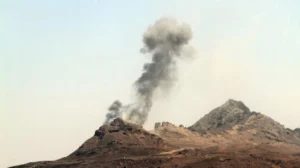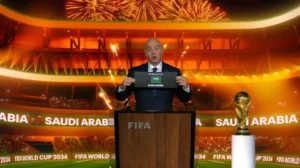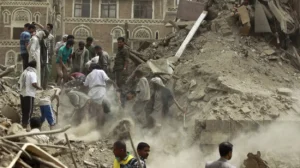- Home
- Why Boycott?
- Human Rights Violations
- Migrant Workers Exploitation & Kafala System Abuse
- Saudi Arabia’s War Crimes
- Freedom of Press and media censorship
- Torture And Unfair Trials
- Saudi Arabia’s Anti-Climate Agenda
- Bogus Stadium Infrastructure
- Sportwashing & Political image
- Saudi Arabia’s Unfair bidding Process
- FIFIA Corruption and Transparency issues
- Poor Treatment of LGBTQ community
- Security risks for spectators
- News
- Get Involved
- Contact Us
War Crimes
Holding Saudi Arabia Accountable for War Crimes
As Saudi Arabia prepares to host the 2034 FIFA World Cup, the global spotlight offers an opportunity not just to showcase sports, but to demand accountability. At the center of growing international concern are credible allegations of war crimes committed by Saudi forces and their allies, particularly during the years-long conflict in Yemen. This section of our campaign sheds light on these atrocities, the ongoing impunity, and why such egregious actions make the country unfit to host one of the world’s most prestigious sporting events.
The War in Yemen: A Humanitarian Catastrophe Fueled by Bombs and Blockades
Since 2015, Saudi Arabia has led a military coalition in Yemen, ostensibly aimed at restoring the internationally recognized government against Houthi rebels. What began as a strategic military operation quickly devolved into one of the world’s worst humanitarian crises. According to the United Nations, over 370,000 people have died as a result of the conflict, many of them civilians. What makes the devastation particularly alarming are the patterns of indiscriminate attacks, systematic targeting of civilian infrastructure, and blockades contributing to famine—all potential war crimes under international humanitarian law.
Hospitals, schools, weddings, funerals, and marketplaces have been bombed. In one infamous 2018 incident, a Saudi airstrike hit a school bus in Saada, killing 40 children. The bomb used was reportedly manufactured in the United States, exposing the international complicity in arming and enabling such acts.
Evidence of War Crimes Committed by Saudi Forces
Independent investigations conducted by organizations such as Human Rights Watch, Amnesty International, and the UN Panel of Experts have documented patterns of violations that amount to war crimes. These include:
-
Indiscriminate and disproportionate airstrikes in civilian areas
-
Use of internationally banned cluster munitions
-
Deliberate starvation of civilians through blockade tactics
-
Arbitrary detention, torture, and enforced disappearances
-
Attacks on humanitarian workers and infrastructure
These are not isolated incidents. They point to a systematic pattern of disregard for the laws of war and the principle of civilian protection, core pillars of the Geneva Conventions and customary international law.
Impunity and the Collapse of Accountability Mechanisms
One of the most disturbing aspects of Saudi Arabia’s role in the war in Yemen is the persistent impunity. Despite the mounting evidence and international outcry, no Saudi military or political leader has been held accountable for war crimes. In fact, Saudi Arabia has worked actively to suppress independent investigations.
In 2021, Saudi diplomatic pressure led to the defunding of the UN Human Rights Council’s Group of Eminent Experts on Yemen—essentially shutting down the only international accountability mechanism investigating abuses on the ground. This move was widely condemned as a blow to justice and a victory for war criminals.
War Crimes and the Question of FIFA’s Responsibility
FIFA claims to promote peace, human rights, and fair play. But awarding the World Cup to a country credibly accused of war crimes undermines every one of those values. Saudi Arabia’s involvement in war crimes should not be seen as a political side issue—it is a moral crisis that disqualifies the kingdom from hosting a global celebration of sport.
Just as apartheid South Africa was excluded from international competitions and Russia was banned from international events following its invasion of Ukraine, the same principles must apply here. The international community, including sporting bodies like FIFA, cannot normalize war crimes through silence and complicity.
Civilian Suffering as a Political Tool
One of the most damning aspects of Saudi Arabia’s strategy in Yemen has been the deliberate infliction of civilian suffering to achieve military and political objectives. Blockades of key ports like Hodeidah have led to fuel shortages, medical crises, and food insecurity. Millions of Yemenis, including children, are malnourished. In the eyes of international law, using starvation as a weapon constitutes a war crime.
This method of warfare—where civilian death and suffering are not collateral but strategic—places Saudi Arabia among the most egregious violators of modern humanitarian norms. And yet, even in the face of this record, the kingdom has been rewarded with hosting rights for the 2034 FIFA World Cup.
Global Silence and Arms Trade Hypocrisy
One reason accountability has remained elusive is the extensive military and political support Saudi Arabia receives from major powers. The United States, United Kingdom, France, and others have continued to sell billions of dollars in weapons to Riyadh despite knowing they may be used in war crimes. The economic incentives of the arms trade have repeatedly trumped human rights concerns.
This hypocrisy has further eroded trust in the international system. If countries can commit war crimes and still be welcomed on the global stage with events like the World Cup, what message does this send to victims and future violators?
The Role of Civil Society in Demanding Justice
Where governments and institutions fail, civil society must lead. Human rights groups, independent journalists, grassroots activists, and legal scholars have played a critical role in documenting atrocities and pushing for international accountability. Campaigns like #BoycottSaudi2034 aim to amplify these voices, using the global attention around the World Cup to shed light on crimes that authoritarian regimes try to conceal.
This is more than a boycott—it is a call to remember that football, like any global platform, carries ethical responsibility. We must not allow the World Cup to become a tool of whitewashing war crimes and rehabilitating war criminals through spectacle.
Impact on Refugees and Regional Stability
The fallout from Saudi Arabia’s war crimes extends far beyond Yemen’s borders. The war has displaced millions, created a refugee crisis, and destabilized the entire region. In many cases, Saudi border guards have reportedly shot and killed migrants attempting to flee to safety, particularly Ethiopian asylum seekers crossing from Yemen into Saudi territory—another grave violation of international law.
Rather than promoting peace and regional cooperation, Saudi foreign policy has fostered violence, displacement, and trauma. Hosting the World Cup amid this record of regional destabilization is not only inappropriate—it is dangerous.
The Double Standard in International Sport
FIFA’s decision to turn a blind eye to war crimes and award the World Cup to Saudi Arabia reflects a growing trend of sport being used for authoritarian legitimization. While sports governing bodies claim neutrality, the choice of host country is inherently political. In the case of Saudi Arabia, it is a tacit endorsement of a regime that has consistently acted outside the bounds of international law.
This is not a theoretical concern. It is a betrayal of the victims of war, and a green light to other regimes who may commit similar atrocities in the future with the expectation of impunity and reward.
A Call for Action and Ethical Accountability
As the 2034 World Cup approaches, it is imperative for FIFA, national football associations, sponsors, athletes, and fans to reflect on what kind of world we want to build through sport. The legacy of this tournament should not be built on mass graves, destroyed cities, and broken families.
Boycotting Saudi 2034 is not just about football—it is about resisting a normalization of war crimes and standing up for justice. It is about honoring the lives lost, the communities shattered, and the international laws we claim to uphold.
Stay Engaged, Spread Awareness
The fight against war crimes doesn’t end in courtrooms—it continues in stadiums, in newsrooms, and in the hearts of those who believe in human dignity. By raising your voice, sharing credible information, and supporting independent investigations, you can play a part in challenging the impunity that allows war crimes to persist.
At BoycottSaudi2034.com, we are committed to documenting these atrocities, supporting affected communities, and demanding justice. Join us in exposing the truth and refusing to allow sports to become a shield for war criminals.








